#user experience SEO
Explore tagged Tumblr posts
Text
The Pillars of SEO: A Comprehensive Guide for 2025
Table of Contents Introduction to SEO Pillars Technical SEO: The Foundation of Search Success On-Page SEO: Crafting Content That Ranks Off-Page SEO: Building Authority and Trust User Experience (UX) and SEO Synergy Content Marketing for SEO: The Power of Value-Driven Content SEO Case Study: How a B2B Brand Increased Organic Traffic by 200% Experiments and SEO Trends in 2025 Impact of SEO…
#AI SEO#B2B SEO#B2C SEO#Core Web Vitals#digital-marketing#Featured Snippets#Google ranking factors#keyword optimization#keyword-research#knowledge panels#link building#local SEO strategy#long-form content SEO#Marketing#mobile-first indexing#off-page SEO#on-page SEO#organic traffic growth#organic-traffic#schema markup#search intent optimization#seo#SEO Case Study#SEO content marketing#SEO pillars#SEO tools 2025#SEO Trends 2025#structured data#technical SEO#user experience SEO
0 notes
Text
Boosting Your Organic Website Traffic: The Ultimate Guide
In today’s competitive digital world, driving traffic to your website is crucial. While paid ads can offer a quick boost, it's the increase in organic website traffic that guarantees long-term growth and sustainability. Why? Because organic traffic consists of visitors who find your site naturally, via search engines like Google, which builds trust and engagement over time. In this blog, we’ll explore some of the best strategies to help you increase organic website traffic and improve your site's visibility.
Why Organic Traffic is Important?
Before we dive into how to increase organic website traffic, let’s understand why it matters so much.
Cost-effective: Organic traffic doesn’t require a continuous investment, unlike paid advertising. Once you rank higher on search engines, you can get visitors for free.
Trust and credibility: Users trust search engines to provide relevant and trustworthy content. High rankings mean your website is considered authoritative, which builds credibility with your audience.
Sustainability: Organic growth tends to be more sustainable in the long term. While paid campaigns offer quick results, organic traffic continues to deliver over time without ongoing costs.
Better user engagement: Visitors who find your site through organic search are more likely to stay, explore, and engage because they’re already looking for what you offer.
Now, let’s explore the best practices and tactics to increase organic website traffic.
1. Optimize Your Content for SEO
Search Engine Optimization (SEO) is the backbone of organic traffic. It ensures that your site appears on the top pages of search engines. Here’s how you can improve your SEO and, in turn, increase organic website traffic:
Keyword Research: Identify keywords relevant to your audience using tools like Google Keyword Planner or SEMrush. Include primary and long-tail keywords in your content.
High-Quality Content: Google favors content that is valuable and answers users’ queries. Creating long-form, informative blogs or guides around the keywords your target audience is searching for is crucial.
On-page SEO: Pay attention to meta tags, title tags, image alt texts, and URL structures. Make sure they contain the focus keyword and are concise.
User Experience: The more time a user spends on your site, the better your chances of ranking higher. Improve your website’s load speed, and make it mobile-friendly and easy to navigate.
By implementing these SEO practices, you’ll see a significant increase in organic website traffic over time.
2. Build Backlinks
Backlinks are still one of the most important ranking factors for search engines. They are essentially votes of confidence from other reputable sites. The more high-quality backlinks you have, the better your chances of ranking higher and driving organic website traffic.
Guest Posting: Writing guest posts on industry-relevant websites is an excellent way to get backlinks. It not only helps with SEO but also introduces you to a new audience.
Outreach: Contact websites and bloggers in your niche and offer to contribute valuable content in exchange for a backlink.
Create Shareable Content: Engaging and valuable content, like infographics, videos, or in-depth research, is more likely to be shared and linked to by others.
3. Leverage Social Media
While social media itself doesn’t directly contribute to your search engine rankings, it can certainly help to increase organic website traffic indirectly.
Promote Your Content: Share your blog posts, infographics, and other content on your social channels to drive traffic to your site.
Engage With Your Audience: Actively engage with your followers on platforms like Twitter, Facebook, and LinkedIn. The more you interact, the more likely people are to visit your site.
Encourage Social Sharing: Add social sharing buttons on your website to encourage visitors to share your content on their platforms.
4. Improve User Experience
Search engines are prioritizing user experience more than ever. Google’s recent algorithm updates focus heavily on how users interact with a website, so improving your UX can help you increase organic website traffic.
Mobile Optimization: With more people browsing the web on their phones, ensure that your website is mobile-friendly.
Speed Up Your Site: A slow-loading website can drastically reduce your traffic. Use tools like Google PageSpeed Insights to test and improve your website’s loading time.
Easy Navigation: Make sure visitors can easily find what they’re looking for on your website. A well-structured menu and internal linking are crucial for a positive user experience.
5. Consistently Publish Fresh Content
Consistency is key when it comes to increasing organic website traffic. Google prefers websites that are regularly updated with fresh content. It signals that your site is active and offers new value to users.
Blog Regularly: A well-maintained blog is one of the most effective ways to drive organic traffic. Make sure you cover topics your audience is searching for and use relevant keywords.
Repurpose Old Content: Update and republish old posts to make them relevant again. This is a great way to improve existing content and get more organic traffic without creating something new.
6. Focus on Long-Tail Keywords
Long-tail keywords are specific search phrases that often have lower competition but a higher conversion rate. By targeting long-tail keywords, you can attract more niche audiences and see a steady increase in organic website traffic.
For example, instead of targeting the keyword "shoes," aim for something more specific like "affordable running shoes for women."
#Organic website traffic#Improve website SEO#Social media for SEO#Content marketing SEO#User experience SEO
0 notes
Text
The Internet was once a great source of information, now
- It's cluttered with AI regurgitation. (This is particularly infuriating to me. If anyone is interested, I could make a post about my thoughts.)
- Old sites are dead and gone.
- Reddit destroyed itself. (I can go on a rant about this too.)
- Too much marketing bullshit.
- Ads! Ads! Ads! Ads! Ads!
- Stupid paywalls.
- Search engines suck at getting you what you want. SEO is a cancer.
- People trying to make a quick buck. I don't mind paying for some things, I'm talking about the 0 effort get-rich-quick crap.
- Propaganda, psyops, scammers, etc.
See enshitification and dead internet theory.
It's hard to filter all this crap out! It's particularly worse for people with conditions like ADHD, Depression, Autism, etc.
It also makes it harder for me to do my job. Sometimes I need specific, slightly in depth information. Due to SEO, I get surface level AI regurgitated crap. Multiple websites, all the same. They also come with a torrent of adverts. It's a user hostile experience. (Maybe I could write my own, better search engine. One that might allow me to blacklist and greenlist certain websites for certain searches. Or one that detects AI generated content and filters. Actually, a browser extension that detects AI generated content might be pretty helpful.)
I think I've run into webpages that just have AI generated recipes. It's awful. I'm at the point where I just want to use physical cookbooks. Those also don't have a novel about some irrelevant backstory and 69,000,000 ads obscuring the recipe. (Now that I think of it, maybe it would be useful to write an app that can convert a physical recipe into a digital one ...)
I don't know what I want, what really needs to change, or how to fix things. All I know is that I am passionately upset.
#enshitification#dead internet#seo#late stage capitalism#psyops#im loosing my mind#artificial intelligence#spam bots#hostile environment#user experience#advertisments#end of the world
37 notes
·
View notes
Text

🚀 Attention Business Owners!
Are you struggling with your WordPress site’s performance? 🖥️📱
Let The Big Shoutout help you optimize your website for lightning-fast speeds and top-notch responsiveness, especially on Google PageSpeed Insights for Mobile. 🔧✅
🎯 What we do:
• Boost your site speed
• Enhance mobile-friendliness
• Improve user experience across all devices
Don’t let a slow website hold you back! 💼💻
📩 WhatsApp us now: Click Here
👉 Get your WordPress site performing at its BEST!
#wordpress expert#website optimization#page speed insight#mobile friendly design#website speedboost#user experience design#web performance#seo optimization#local business growth#website consultant#web dev solutions#digital marketing#wordpress services#mobile optimization#fast load website
3 notes
·
View notes
Text
Let us discusses how Page Load Speed and User Experience are related in SEO. Page Load Speed is a major factor helps in the enhanced SEO performance. Fast-loading websites lead to better engagement and higher conversion rates. It increases the traffic to our website and thus overall ranking will be improved.
2 notes
·
View notes
Text
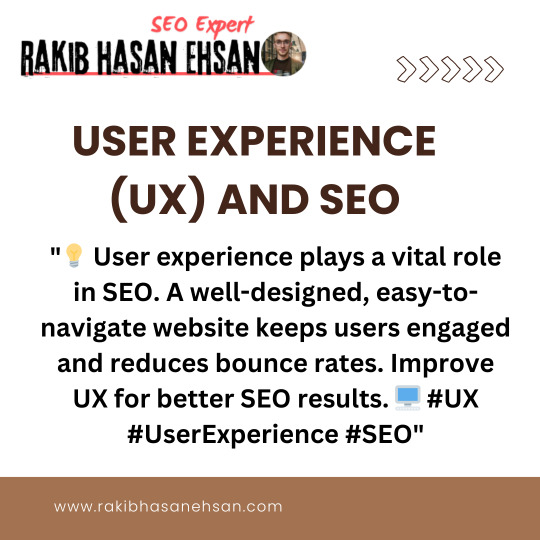
#ux#user experience#seo tips#seo#businessgrowth#digitalmarketing#marketing#searchengineoptimization#seo services#seo marketing#onlinemarketing#marketingstrategy
5 notes
·
View notes
Text
Unveiling the Best SEO Worker in Bangladesh: Driving Digital Success
#https://dev-seo-worker-in-bangladesh.pantheonsite.io/home/: With years of experience and a deep understanding of search engine algorithms#[Insert Name] possesses unparalleled expertise in SEO strategies and techniques. They stay abreast of the latest trends and updates in the#ensuring that clients benefit from cutting-edge optimization practices.#Customized Solutions: Recognizing that each business is unique#[Insert Name] tailors their SEO strategies to suit the specific needs and goals of every client. Whether it's improving website rankings#enhancing user experience#or boosting conversion rates#they craft personalized solutions that yield tangible results.#Data-Driven Approach: [Insert Name] firmly believes in the power of data to drive informed decision-making. They meticulously analyze websi#keyword performance#and competitor insights to devise data-driven SEO strategies that deliver maximum impact.#Transparent Communication: Clear and transparent communication lies at the heart of [Insert Name]'s approach to client collaboration. From#they maintain open lines of communication#ensuring that clients are always kept informed and empowered.#Proven Results: The success stories speak for themselves. Time and again#[Insert Name] has helped businesses across diverse industries achieve unprecedented growth in online visibility#organic traffic#and revenue generation. Their impressive portfolio of satisfied clients serves as a testament to their prowess as the best SEO worker in Ba#Continuous Improvement: In the dynamic landscape of SEO#adaptation is key to staying ahead. [Insert Name] is committed to continuous learning and refinement#constantly refining their skills and strategies to stay at the forefront of industry best practices.#In conclusion#[Insert Name] stands as a shining beacon of excellence in the realm of SEO in Bangladesh. Their unw
3 notes
·
View notes
Text
8 UX Tips for Voice Search SEO
💡 Advanced SEO Pro Certification Course by Anil Varma - Registration Link in the first comment. ❤️ Follow Semly Pro - The SEO Company for more SEO tips. 🎙 Content and Design by Surya Pillai Implement these 8 UX Tips for Voice Search SEO:

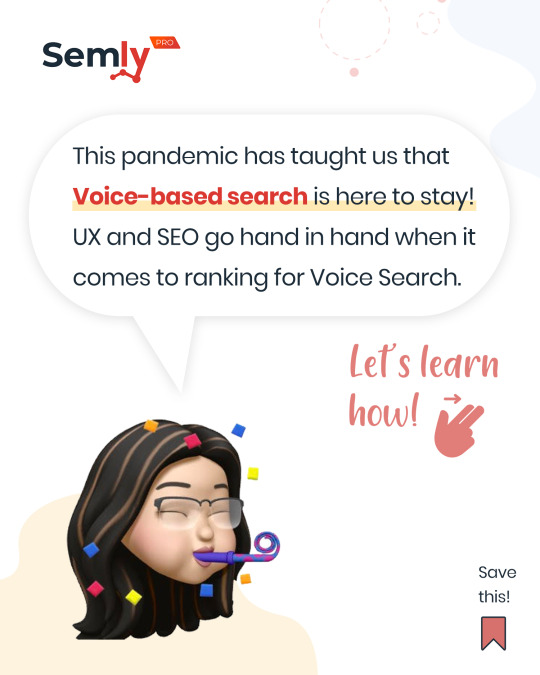
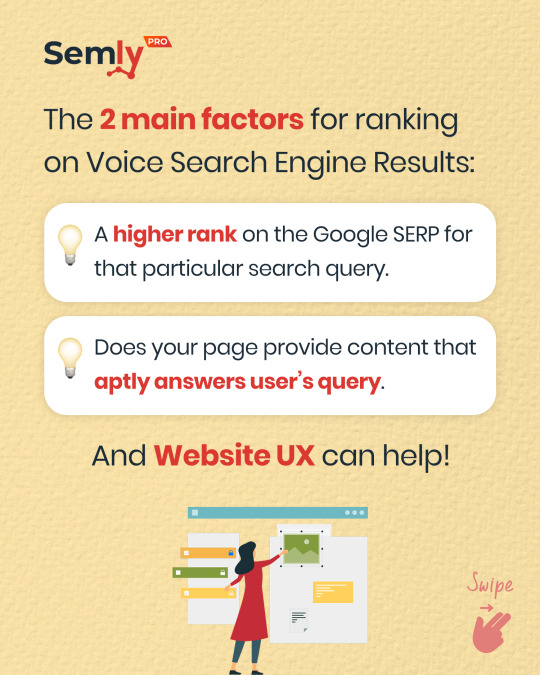
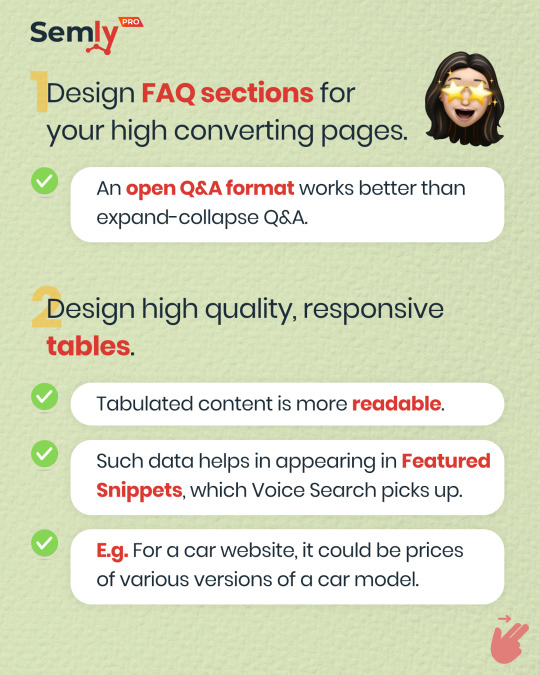
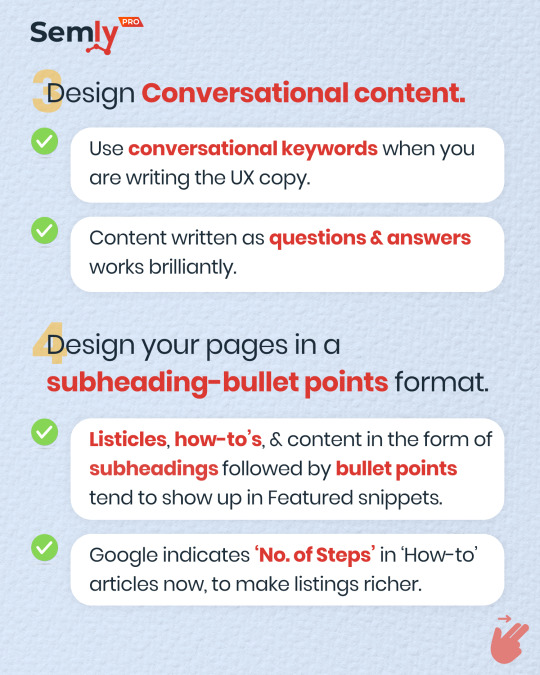
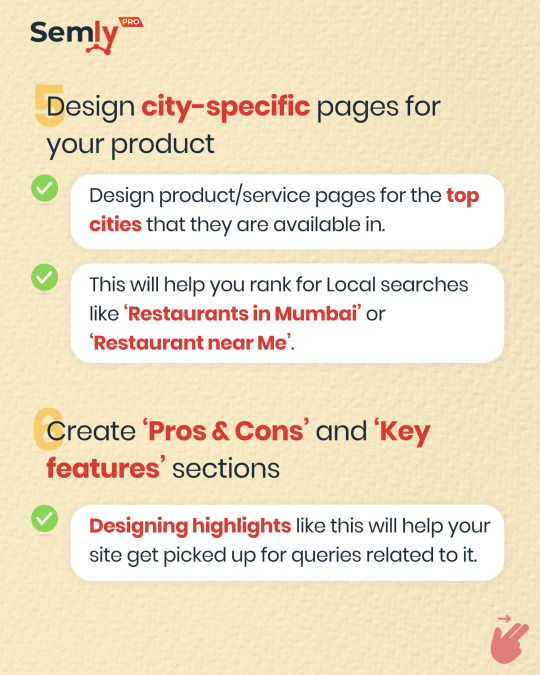
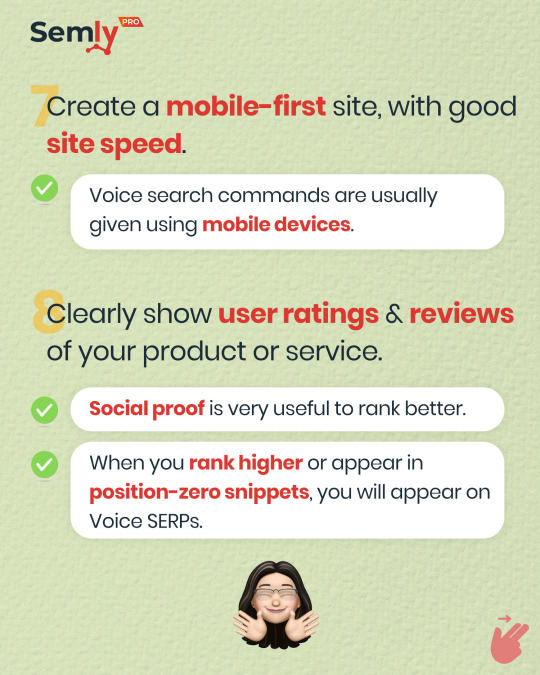
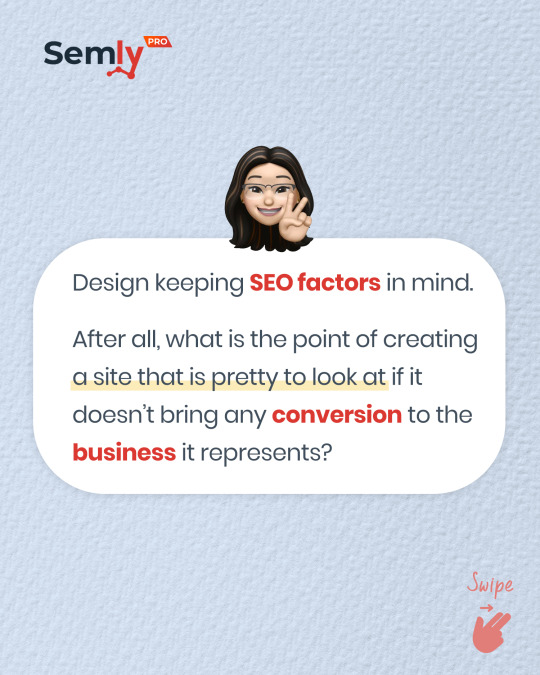
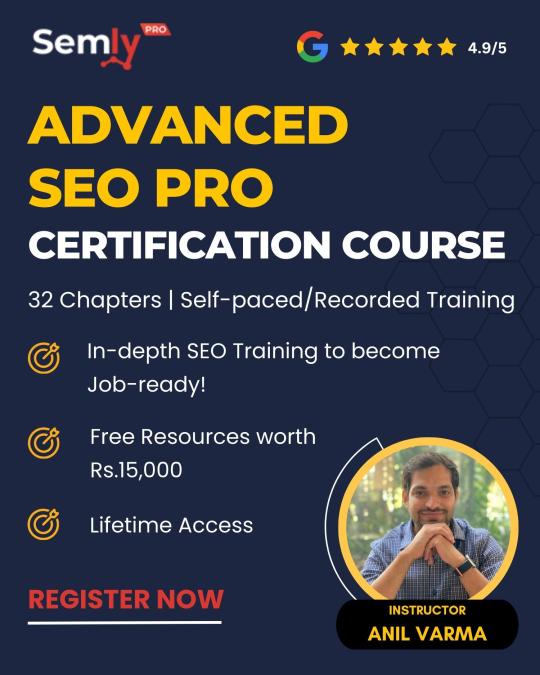
💡 Advanced SEO Pro Certification Course by Anil Varma - REGISTER NOW ❤️ Follow Semly Pro - The SEO Company for more SEO tips. 🎙 Content and Design by Surya Pillai.
#digital marketing#Digital Marketing Tips#search engine optimization#SEO#SEM#search engine marketing#ux#semly pro#semlypro#anil varma#user experience design#surya pillai#google#google search#google analytics
5 notes
·
View notes
Text
E-commerce SEO Strategies Unveiled: Boosting Sales and Visibility
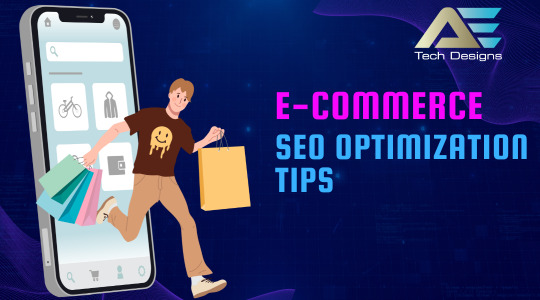
In the ever-evolving landscape of e-commerce, staying ahead of the competition requires not only a compelling product but also a well-optimized online presence. In this comprehensive guide, we will delve into the world of E-commerce SEO optimization. No buzzwords, just actionable insights to enhance your online store's visibility and boost sales. Let's get started
Understanding the Basics
To lay a solid foundation, let's start with the basics. E-commerce SEO optimization involves a series of on-page and off-page strategies aimed at improving your website's ranking on search engine results pages (SERPs). This optimization is pivotal for attracting high-quality organic traffic, increasing sales, and staying competitive in the digital marketplace.
Keyword Research
The cornerstone of any successful SEO campaign is thorough keyword research. Begin by compiling a list of relevant keywords that reflect your products, services, and industry. In addition to your primary keywords, consider long-tail keywords, as they often have less competition and can yield highly targeted traffic. For instance, if you're a digital marketing agency in Seattle, keywords like "digital marketing services in Seattle" and "Seattle SEO company" are goldmines.
On-Page Optimization
High-Quality Content: Your website's content should not only be unique but also provide value to your audience. Craft product descriptions, blog posts, and landing pages that resonate with your target audience. Incorporate the primary and long-tail keywords naturally within the content while maintaining readability and a professional writing style.
Page Titles and Meta Descriptions: Ensure that each page has a unique and descriptive title tag and meta description. These elements should include relevant keywords and provide a concise summary of the page's content. This encourages users to click through to your website from the search results.
Header Tags: Use header tags (H1, H2, H3, etc.) to structure your content. This not only improves readability but also helps search engines understand the hierarchy of information on your pages.
User Experience (UX) Matters
Google values user experience, so make sure your website is user-friendly. Optimize for mobile devices, improve page load times, and ensure intuitive navigation. A seamless UX not only pleases visitors but also satisfies search engine algorithms.
Backlink Building
Off-page SEO is as crucial as on-page optimization. Seek high-quality backlinks from reputable websites in your industry. Guest posting, influencer collaborations, and participating in industry forums can all help in this regard.
Monitoring and Analytics
Track your SEO efforts using tools like Google Analytics and Google Search Console. Regularly review your website's performance, make necessary adjustments, and stay updated on SEO trends and algorithm changes.
Conclusion:
In the ever-competitive world of e-commerce, mastering SEO optimization is your key to success. By adhering to these strategies and tips, you can enhance your website's visibility, drive organic traffic, and ultimately boost your sales. If you're seeking expert assistance, consider partnering with AE Tech Design Agency, your trusted SEO company in Seattle. Contact us today to explore how our digital marketing services can elevate your online presence and drive meaningful results.
Remember, the world of SEO is constantly evolving, so staying informed and adapting your strategies accordingly is essential for long-term success.
#E-commerce SEO#SEO Optimization#E-commerce Strategies#SEO Tips#Organic Traffic#Search Engine Rankings#Keyword Research#On-Page SEO#Off-Page SEO#User Experience (UX)#Backlink Building#Local SEO#Google Analytics#Digital Marketing#SEO Trends#SEO Algorithm#Online Visibility#Website Performance#SEO Company#Seattle Digital Marketing
6 notes
·
View notes
Text
When navigating the digital marketing sphere, businesses are often presented with a conundrum: to go organic with Search Engine Optimisation (SEO) or to invest in Pay-Per-Click (PPC) advertising. Each has its merit; SEO builds credibility and garners organic traffic, while PPC assures immediate visibility and traffic. Read the article to know more.
#SEO#PPC#digital marketing strategies#search engine optimisation#pay-per-click#combined strategies#online visibility#keyword optimisation#cost efficiency#data insights#brand credibility#user experience#organic traffic#paid advertising
3 notes
·
View notes
Text
How Quality SEO Depends on Good User Experience?
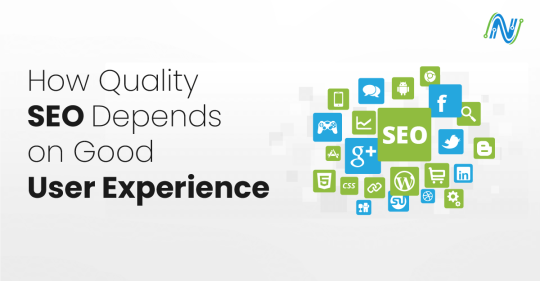
Search engine optimization (SEO) is crucial in improving a website's visibility and driving organic traffic. However, the success of SEO efforts depends heavily on providing a good user experience to visitors. SEO professionals and website owners must recognize the significance of user experience in achieving optimal search engine rankings and sustained organic traffic. This blog explores the critical link between SEO and user experience. It will highlight why user experience is integral to SEO success, discuss how user experience influences search engine rankings, and provide strategies for improving user experience to enhance SEO performance. Let’s get started.
Understanding User Experience
User experience (UX) refers to a user's overall experience when interacting with a website, application, or digital product. It encompasses the user's emotions, perceptions, and responses throughout their journey on the platform. A positive user experience is characterized by ease of use, intuitive design, efficiency, and satisfaction.
Website loading speed:
Slow-loading websites frustrate users and increase bounce rates. Optimizing website performance and reducing loading times are crucial for a positive user experience.
Mobile responsiveness:
With the increasing use of mobile devices, websites must be optimized for different screen sizes and resolutions. Responsive design ensures the website adapts seamlessly to various devices, offering a consistent experience.
Easy navigation:
Intuitive navigation allows users to find the information they need quickly and effortlessly. Clear and well-organized menus, logical site structure, and intuitive user interfaces provide a smooth navigation experience.
Engaging and relevant content:
High-quality and relevant content that meets users' needs and expectations is essential. It should be well-written, visually appealing, and provide valuable information, answering user queries effectively.
How User Experience Enhances SEO
Lower bounce rates and increased time on site:
Websites that provide a positive user experience tend to have lower bounce rates and increased time on site. When users find the information they need quickly, navigate smoothly, and engage with valuable content, they are more likely to stay longer on the website. This decreased bounce rate and increased time on site send positive signals to search engines, indicating that the website is relevant and helpful to users, potentially resulting in improved search rankings.
Improved click-through rates and organic search visibility:
A well-designed and user-friendly website can lead to higher click-through rates (CTRs) in search engine results. When the website's title and meta description are compelling and accurately reflect the content, users are likelier to click on the link. A higher CTR increases organic search visibility and sends a positive signal to search engines, indicating that the website meets users' expectations and needs.
Increased social signals and user engagement:
Websites with excellent user experiences generate higher engagement and social signals. Engaged users are likelier to share content on social media platforms, comment on articles, and interact with the website through likes, shares, and follows. These social signals can indirectly impact SEO by driving referral traffic, increasing brand visibility, and potentially attracting natural backlinks.
Higher chances of natural backlinks:
Websites that prioritize user experience and provide valuable content are more likely to attract natural backlinks from other authoritative websites. When users find a website helpful, informative, and trustworthy, they are more inclined to reference and link to it in their content. Natural backlinks are highly valuable for SEO, as they signal to search engines that the website is reputable and deserves higher rankings.
Mobile-first indexing and the importance of mobile user experience:
With the increasing prevalence of mobile devices, search engines have adopted mobile-first indexing, prioritizing the mobile version of websites for search rankings. A seamless mobile user experience, including responsive design, fast loading speed, and intuitive navigation, becomes crucial for SEO success. Websites prioritizing mobile user experience are more likely to rank higher in mobile search results, driving organic traffic from mobile users.
Strategies to Improve User Experience for Better SEO Performance
Optimize website loading speed:
Enable browser caching and compression.
Minify CSS, JavaScript, and HTML files.
Optimize images for the web without compromising quality.
Use a content delivery network (CDN) to distribute content geographically.
Implement responsive web design:
Ensure the website design is mobile-friendly and adapts to different screen sizes.
Use responsive templates or themes.
Test the website's responsiveness on various devices and browsers.
Improve website navigation and site structure:
Create a clear and logical site structure with well-organized categories and subcategories.
Implement a user-friendly navigation menu with descriptive labels.
Include a search bar for easy content discovery.
Use breadcrumb navigation to show users their location within the site.
Create high-quality and engaging content:
Conduct thorough keyword research to identify user intent and popular search terms.
Develop informative, well-written content that answers users' questions and provides value.
Use headers, bullet points, and subheadings to enhance readability.
To make the content engaging, incorporate multimedia elements, such as images, videos, and infographics.
Use compelling visuals and multimedia elements:
Optimize images by compressing file sizes and adding descriptive alt tags.
Include relevant videos and enhance the user experience.
Incorporate interactive elements like quizzes, surveys, or calculators to engage users.
Optimize for mobile users:
Ensure the website is mobile-responsive and provides a seamless experience on mobile devices.
Optimize fonts, buttons, and menus for mobile screens.
Use responsive images and avoid using large media files that may slow the mobile loading speed.
Implement mobile-specific features, such as click-to-call and mobile-friendly forms.
Conclusion
In the ever-evolving world of SEO, user experience plays a pivotal role in determining the success of website optimization efforts. A positive user experience enhances engagement, conversions, and overall user satisfaction and directly impacts SEO performance. By optimizing website loading speed, implementing responsive design, improving navigation, creating high-quality content, utilizing compelling visuals, and optimizing for mobile users, website owners can improve the user experience and reap the benefits of enhanced SEO.
If you're looking to improve your website's visibility, increase organic search rankings, and enhance the user experience, Nodesol Corp is here to help. Our comprehensive approach combines technical SEO, content optimization, and user experience strategies to create a seamless journey for your website visitors. Contact Nodesol Corp today to discuss your SEO and user experience needs.
5 notes
·
View notes
Text
The Evolving Landscape of SEO: A Year of Transformations in Google's Algorithms and Beyond
Introduction: As a seasoned SEO professional, I have closely observed the dynamic nature of search engine optimization and the ever-changing algorithms employed by Google. Over the past year, the SEO industry has witnessed significant transformations that have reshaped the way websites design services are ranked, the appearance of search engine results pages (SERPs), the prominence of local SEO, and the integration of AI in SEO strategies. In this article, I will outline the top 10 changes in SEO and Google, highlighting the key insights and trends that have emerged during this transformative period.
Algorithm Updates:
Google's algorithm updates have always been a focal point for SEO professionals, and the past year has been no exception. From the introduction of Core Web Vitals as a ranking factor to the continuous refinement of algorithms like BERT and RankBrain, Google has been on a mission to provide users with more relevant and high-quality search results.
SERP Enhancements:
Google has been constantly refining the appearance of its SERPs to enhance user experience and provide more contextually relevant information. Features like featured snippets, knowledge panels, and local packs have become more prominent, leading to a shift in SEO strategies towards optimizing for these rich results.
Rise of Zero-Click Searches:
With the growing prevalence of featured snippets and rich results, there has been an increase in zero-click searches, where users find the information they need directly on the SERP without clicking through to a specific website. This trend has necessitated a shift in SEO focus towards optimizing content for visibility in featured snippets to maintain organic traffic.
Mobile-First Indexing:
Google's mobile-first indexing initiative reached a significant milestone over the past year, with mobile versions of websites websites design services becoming the primary basis for indexing and ranking. This shift has emphasized the importance of mobile optimization, responsive design, and fast-loading pages in SEO strategies.
Core Web Vitals:
Google's introduction of Core Web Vitals as a ranking factor has underscored the significance of user experience metrics like page speed, interactivity, and visual stability. SEO professionals are now paying closer attention to factors that directly impact the user's website experience, emphasizing the need for optimizing performance and enhancing overall website usability.
Local SEO Dominance:
The past year has seen a further rise in the importance of local SEO, driven by increased user reliance on local search for finding products and services. Google My Business (GMB) optimization, local citations, and the prominence of map packs have become critical elements in local SEO strategies, providing businesses with an opportunity to target specific geographical areas.
E-A-T and Content Quality:
Google's focus on expertise, authoritativeness, and trustworthiness (E-A-T) has continued to shape SEO practices, with an emphasis on producing high-quality, authoritative content. Websites that demonstrate expertise and provide trustworthy information are more likely to rank higher in search results, making E-A-T an essential consideration in content creation and optimization.
Voice Search and AI:
The integration of AI-powered voice assistants, like Google Assistant and Amazon Alexa, has had a profound impact on SEO. Optimizing for voice search and conversational queries has become crucial, as search engines strive to understand natural language patterns. SEO professionals are now adapting their strategies to align with the nuances of voice-based search and provide users with concise, contextually relevant answers.
User Intent Optimization:
Understanding and fulfilling user intent has become a fundamental aspect of SEO. Google's algorithms are becoming increasingly adept at deciphering user intent, and websites that align their content to match user expectations are rewarded with higher rankings. SEO professionals now focus on creating content that satisfies specific user queries and intents, driving more targeted organic traffic.
Machine Learning and RankBrain:
Google's RankBrain algorithm, which utilizes machine learning to process search queries and improve search results, has continued to evolve. SEO professionals are now harnessing the power of machine learning to gain insights, identify patterns, and refine their strategies. Advanced SEO tools and techniques powered by AI are becoming indispensable for effective keyword research, competitor analysis, and overall SEO performance.
Conclusion: The past year has been transformative for SEO, with Google's algorithm updates, changes in SERP appearance, the rise of local SEO, the integration of AI, and the evolving understanding of user intent. To stay ahead in this ever-evolving landscape, SEO professionals must continually adapt their strategies, optimize for mobile and user experience, prioritize local search, and leverage AI-powered tools. By embracing these changes and keeping a keen eye on emerging trends, SEO practitioners can thrive in the dynamic world of search engine optimization.
#SEO#Google Algorithms#Search Engine Optimization#SEO Trends#Digital Marketing#Google Updates#SEO Strategies#Algorithm Changes#SEO Best Practices#Website Optimization#SERP (Search Engine Results Page)#Organic Traffic#Content Marketing#SEO Techniques#Keyword Research#Link Building#Mobile SEO#Voice Search Optimization#User Experience (UX)#SEO Analytics
6 notes
·
View notes
Text
Why SEO is important for marketing purpose of a business?
SEO, or search engine optimization, is important for the marketing purposes of any business because it helps increase the visibility and accessibility of the company's website and content on search engines such as Google.
By optimizing the website and content for relevant keywords and phrases, the company can rank higher in search engine results pages (SERPs), which can drive more organic traffic to the website as well as increase sales.
Some of the benefits of SEO are:
Increased visibility and traffic SEO helps your website rank higher in search engine results pages (SERPs) for relevant keywords and phrases, which in turn increases visibility and traffic to your website.
This is important because the higher your website ranks, the more likely people are to click through to your site.
Improved user experience Good SEO involves optimizing your website's content and structure to make it user-friendly and easy to navigate. This can lead to a better user experience for your visitors, which can increase engagement and conversions.
Cost-effective SEO can be a cost-effective marketing strategy compared to other forms of advertising. While it does require an investment of time and resources, once your website is optimized, it can continue to generate traffic and leads over time without the need for ongoing ad spend.
Long-term benefits Unlike paid advertising, the benefits of SEO can last long after your initial investment.
While it may take time to see results, once your website starts ranking higher, it can continue to do so for months or even years, as long as you continue to maintain your website's SEO.
Overall, SEO is an essential aspect of any company's marketing strategy. By optimizing their website and content for search engines, they can increase their online visibility, attract more qualified leads, build credibility and trust, and ultimately drive more conversions and revenue.

#SEO#Increased visibility and traffic#Improved user experience#Cost-effective#once your website is optimized#Long-term benefits#Unlike paid advertising#once your website starts ranking higher#it can continue to do so for months or even years#build credibility and trust#searchengineoptimization#digitalmarketing#contentmarketing#keywordresearch#linkbuilding#onpageseo#offpageseo#googlealgorithm#serp#backlinks#organictraffic#ppc#sem#googleranking#websiteoptimization#webanalytics#mobileseo#localseo#voicesearchoptimization#gmb
5 notes
·
View notes
Text
The Power of SEO: Why Analysis and Reporting are Key to Website Success
In today's digital landscape, a strong online presence is crucial for business success. Search Engine Optimization (SEO) plays a vital role in achieving this, ensuring your website ranks high in search engine results and attracts the right audience. But simply having a website isn't enough. To truly harness the power of SEO, you need consistent analysis and reporting.

Why SEO Analysis Matters
SEO analysis is the process of evaluating your website's performance in search engines. It involves examining various factors, including:
Keyword Rankings: Where your website appears in search results for relevant keywords.
Organic Traffic: The number of visitors who find your website through search engines.
Backlinks: Links from other websites to yours, which are a strong indicator of authority and credibility.
Website Speed: How quickly your website loads, a critical factor for user experience and search engine rankings.
Content Performance: How well your website content engages visitors and meets their needs.
Technical Health: Ensuring your website is free of technical issues that could hinder search engine crawling and indexing.
By understanding these elements, you can identify areas where your website excels and areas that need improvement.
The Importance of SEO Reporting
SEO reporting takes the analysis a step further, presenting the data in a clear, concise, and actionable format. A good SEO report should:
Track Key Performance Indicators (KPIs): Focus on the metrics that matter most to your business goals, such as bounce rate, conversion rate, and time on site.
Provide Insights, Not Just Data: Explain the "why" behind the numbers, helping you understand the impact of your SEO efforts.
Offer Actionable Recommendations: Suggest specific steps you can take to improve your website's performance.
Amity IT: Your Partner in SEO Success
Amity IT understands the importance of SEO analysis and reporting. They offer comprehensive services to help businesses like yours thrive online.
Here's how Amity IT can help:
Data-Driven Approach: They use industry-leading tools like Semrush, Google Analytics 4, and Google PageSpeed Insights to gather accurate and insightful data.
Customized Solutions: Their services are tailored to your specific business needs and goals.
Comprehensive Reports: They provide detailed reports covering all aspects of your website's SEO performance, including technical health, content, backlinks, and keyword rankings.
Actionable Recommendations: They don't just provide data; they offer clear and practical steps you can take to improve your SEO.
Ongoing Support: They provide continuous support to ensure your website remains optimized and competitive.
Amity IT creates customized digital dashboards that consolidate SEO and digital performance data from various sources.
Ready to unlock the full potential of your website?
Visit Amity IT's SEO Analysis and Reporting service page to learn more about how they can help you achieve measurable results. Sources and related content
#SEO analysis#SEO reporting#Website optimization#Search engine optimization#Keyword performance#Organic traffic Technical#SEO Backlink analysis#Content strategy#SEO metrics#Competitor analysis#User experience#SEO#SEO services#Website performance#SEO tools
0 notes
Text
0 notes
Text
Why Choose a Website Design Agency in Bangalore for Your Business?
Choosing a website design agency in Bangalore offers access to top talent, competitive pricing, and cutting-edge technology. With a focus on user-friendly, responsive designs, these agencies deliver fast, scalable solutions tailored to your business needs. Their expertise ensures your website stays ahead of trends, driving growth and engagement in an increasingly digital world.
#Website Design#Bangalore Web Design#Web Development#Digital Marketing#User Experience#Responsive Design#Web Design Agency#Business Growth#E-commerce Websites#SEO#Digital Solutions#Custom Websites#Mobile Optimization#Web Design Trends#Affordable Web Design
1 note
·
View note